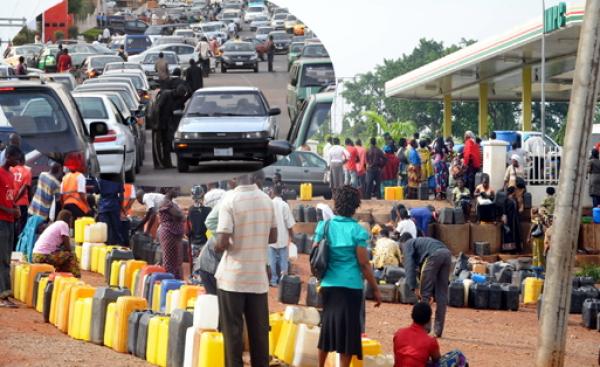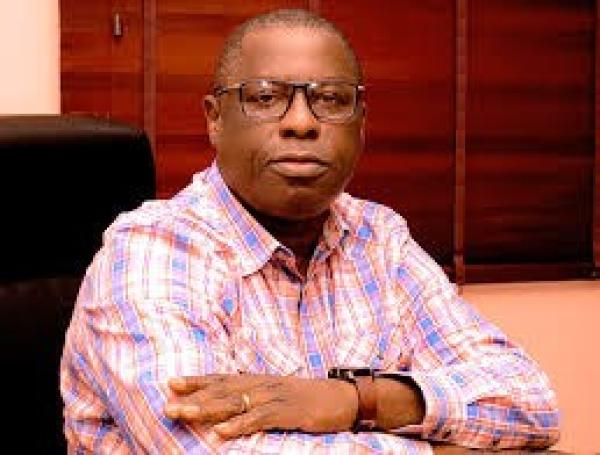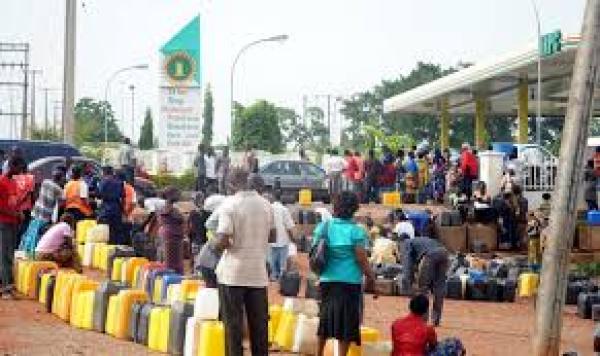
Nigeria is one of Africa’s top crude oil producers, but gasoline shortages are commonplace, mostly as a result of frequent strikes and supply disruptions. As on previous occasions, Nigeria’s state oil firm accused fuel companies of exploiting the current situation to maximize profit. Nigeria relies heavily on imported fuel due to underperforming refineries. The biggest refinery in Africa opened recently in Lagos, Nigeria’s economic hub, and is expected to boost refining capacity. However, the privately owned facility still produces only diesel and aviation fuel.
Meanwhile, Nigerians in recent days, have been queuing for hours to buy fuel across major cities for some days now as the West African nation struggled with its latest fuel shortage, causing more hardship for millions already struggling in an economic crisis. The fuel shortage has led to an increase in transportation costs in the country where many people rely on public transportation. The country has been experiencing persistent petrol shortages since President Bola Tinubu announced the removal of subsidies previously paid for the importation of refined fuel into the country.
The Nigerian National Petroleum Company Limited (NNPC) attributed the recent scarcity of fuel in some regions of the country to logistical problems impacting the distribution of the product in those areas. The spokesperson of the NNPC, Olufemi Soneye, said that the logistics issues have been fully resolved, and added that there will now be fuel availability in those regions. The authorities also blamed the shortage on supply disruptions due to logistical challenges. Similarly, oil marketers blamed the fresh scarcity of petrol on supply challenges from the NNPC. National President of the Petroleum Products Retail Outlets Owners Association of Nigeria (PETROAN), Billy Gillis-Harry, noted the supply challenge.
Meanwhile, NNPC the country’s oil giant, stated that it has delivered more litres of petrol to depots for oil marketers. Furthermore, other few factors causing the scarcity of fuel recently and the typical inflation that follows are, increase in the price of vessels, unstable value of the naira, inadequate refinery capacity, continuous pipeline vandalism, corruption, and mismanagement, etc.
On possible solutions to the frequent scarcity, Petrol Marketers said the scarcity of petroleum products would end if the government decentralises the distribution of the product. To solve scarcity of fuel, government must decongest Lagos by sending petroleum products to coastal depots in Port Harcourt, Calabar and Warri. “By decentralising supply and distribution from Lagos to other depots; it would become easier for IPMAN members to lift products and distribute to filling stations. Further, existing refineries must undergo extensive rehabilitation and modernization. Investment in new technologies, skilled personnel, and improved management practices would enhance refining capacity and reduce reliance on imported fuel. Nigeria must also explore alternative energy sources such as renewable energy, including solar and wind power. Diversification would reduce dependence on fossil fuels and create additional sources of energy for various sectors, lessening the pressure on the fuel supply system. Effective security measures must be put in place to safeguard pipelines against vandalism and illegal tapping. Collaborating with local communities and law enforcement agencies can help in curbing these criminal activities, ensuring a continuous supply of fuel across the country. Combating corruption requires increased transparency and accountability in the petroleum industry. Implementing strong governance frameworks, monitoring mechanisms, and stricter penalties for corrupt practices are crucial to ensuring that resources meant for infrastructure development and maintenance are not misappropriated.
Citizens can hold government officials and fuel suppliers accountable for addressing the root causes of fuel scarcity. By speaking out against inefficiencies and advocating transparency and reform, citizens can push for long-term solutions to the problem. Citizens can support local initiatives to increase domestic oil production, refine crude oil locally, and invest in infrastructure improvements. By promoting local production and reducing dependence on imported fuel, citizens can help strengthen the country’s energy security and resilience. Citizens can join or support community-based initiatives that promote sustainability, energy efficiency, and responsible fuel use. By working together with neighbours, local organisations, and businesses, citizens can collaborate to find innovative solutions to the problem of fuel scarcity.
CEOAFRICA gathered that the problem of fuel scarcity in Nigeria requires a coordinated and multi-faceted approach, with citizens playing a crucial role in finding lasting solutions. Through collective action and shared responsibility, citizens can help address the root causes of fuel scarcity and pave the way for a more secure and resilient energy future in Nigeria.






















